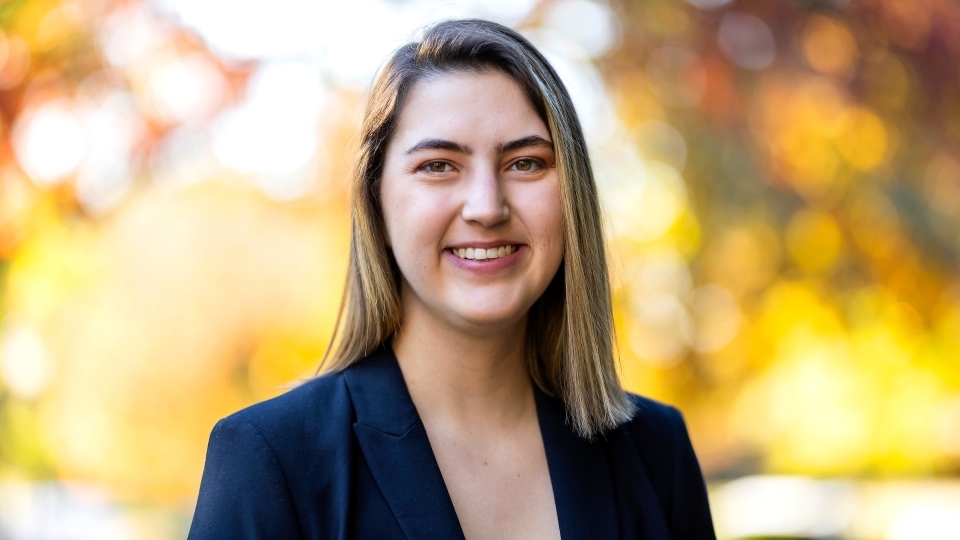Moving From the Loudest Voice to Listener, From Debate to Deliberation
January 4, 2022
- Author
- Cadie McNaboe '22

Cadie McNaboe is a senior political science major at Davidson College.
When I first heard of the Deliberative Citizenship Initiative (DCI), I was skeptical. I had learned about the power of debate through competition, but I struggled to understand how deliberation was different, to say nothing of better.
Debate had taught me that if I had an opinion, and I had the language to share it, I should. Always. Which, in my case, meant that I was always the opinionated one. At Davidson, this is celebrated—professors loved that I was engaged, and my peers were excited that I was always ready for the next argument.
My voice was often the loudest. But through my work with the DCI, I learned that my voice could be so much more.
Debate emphasizes the individuality of our perspectives. I’m right. You’re wrong. Deliberation, meanwhile, highlights the power of our voices in conjunction with others. We don’t need others for our voices to be powerful, but our individual perspectives benefit when we share candidly and listen genuinely.
As a facilitator in the deliberations, my role wasn’t to amplify my own thoughts. Instead my goal was to create space for all participants to share, and then guide them in seeing how their different perspectives overlapped. Going from a mindset that highlights the importance of your opinion to a model where all voices are meant to be equal, was a fundamental shift.
I didn’t make this shift instantly. It manifested in small changes here and there.
As a facilitator in the deliberations, my role wasn’t to amplify my own thoughts. Instead my goal was to create space for all participants to share, and then guide them in seeing how their different perspectives overlapped. Going from a mindset that highlights the importance of your opinion to a model where all voices are meant to be equal, was a fundamental shift.
One of the first things I noticed was that I started showing up to classes with a different mindset.
Deliberation facilitators are taught to create a conversation map that tracks crosstalk between participants. This visualization ensures that no single voice dominates the conversation. In my classes, I noticed myself creating these maps. I counted my own comments and started to notice the space I was taking. I recognized that I had a lot to say, but that my classmates did, too. That recognition, paired with the open and attentive listening that deliberation requires, allowed me to step back and give space to others, even if I didn’t like or agree with what they were saying.
I also found this to be instructive in my personal life. In my family, the dining room table serves as both a space for eating and a space for political conversation, especially around the holidays. As someone who frequently and vehemently disagrees with some members of my family, it’s never been a space I looked forward to. In the fall of 2021, my small, tight-knit family got together for the first time in over a year. I was cautiously optimistic that we might be able to be civil for the afternoon.
I was wrong.
After tables had been set and plates had been filled, we dove into our food and our politics. The scene quickly became chaotic. Everyone was talking, or perhaps more accurately yelling, and no one was listening. I found myself uninterested in adding to the chaos. I wanted to facilitate us through it.
In that moment, it wasn’t about all of the areas where they disagreed—it was about finding the connections that could be made in what they were saying, and seeing the values behind their truths
I’m not confident that anyone left that dinner dramatically changed, which is part of the process. Deliberation taught me that, like my own story, change is incremental. More importantly, I recognized that I had grown.
My life has become a reflection of my own changed perspective. I didn’t avoid difficult conversations with those with whom I disagreed, I embraced them. I didn’t show up to meetings and classrooms ready to fight, I came ready to listen and learn. I’m still not sure if deliberation can transform our democracy, but what I do know for certain is that deliberation has fundamentally transformed me.
–Cadie McNaboe '22
This article was originally published in the Fall/Winter 2021 print issue of the Davidson Journal Magazine; for more, please see the Davidson Journal section of our website.



